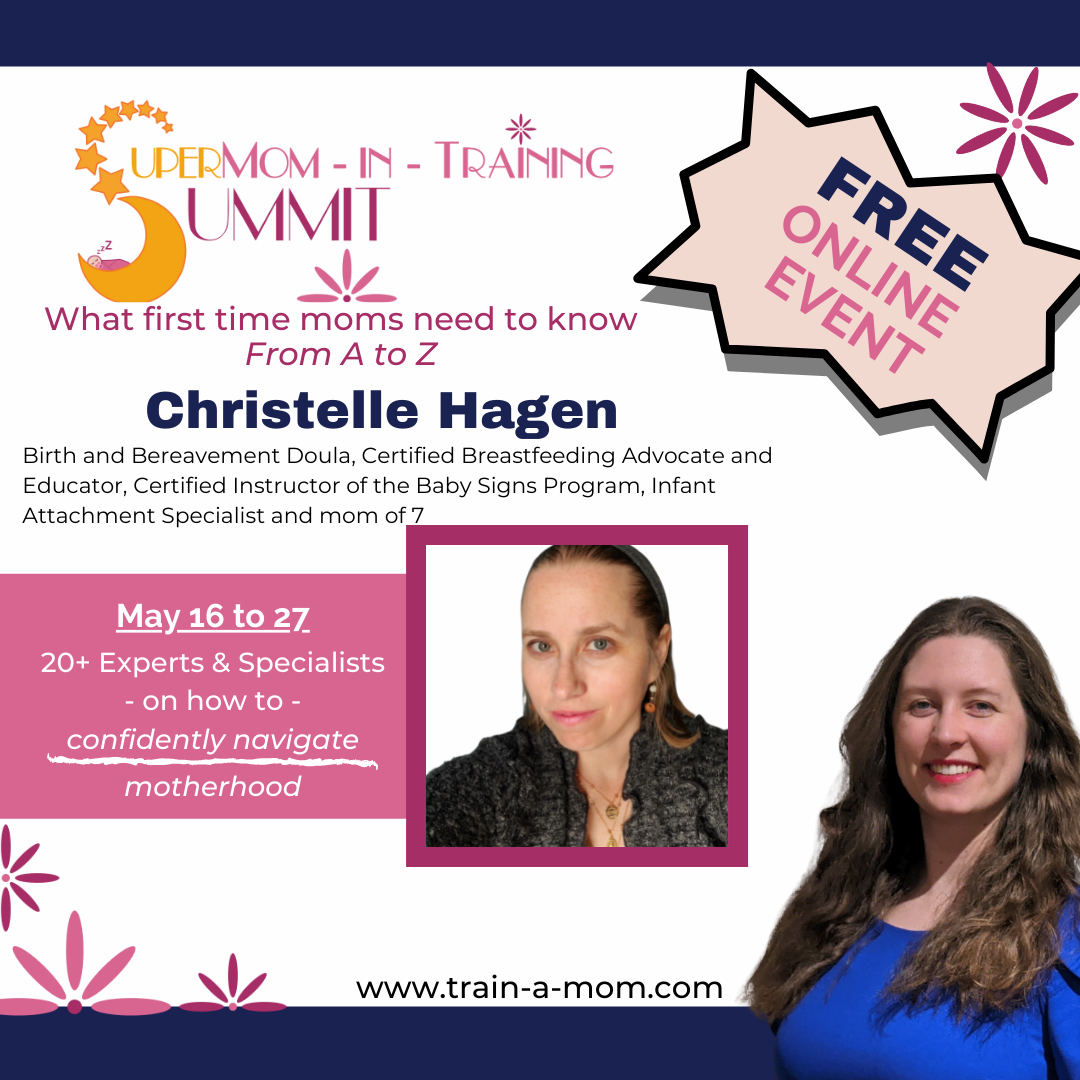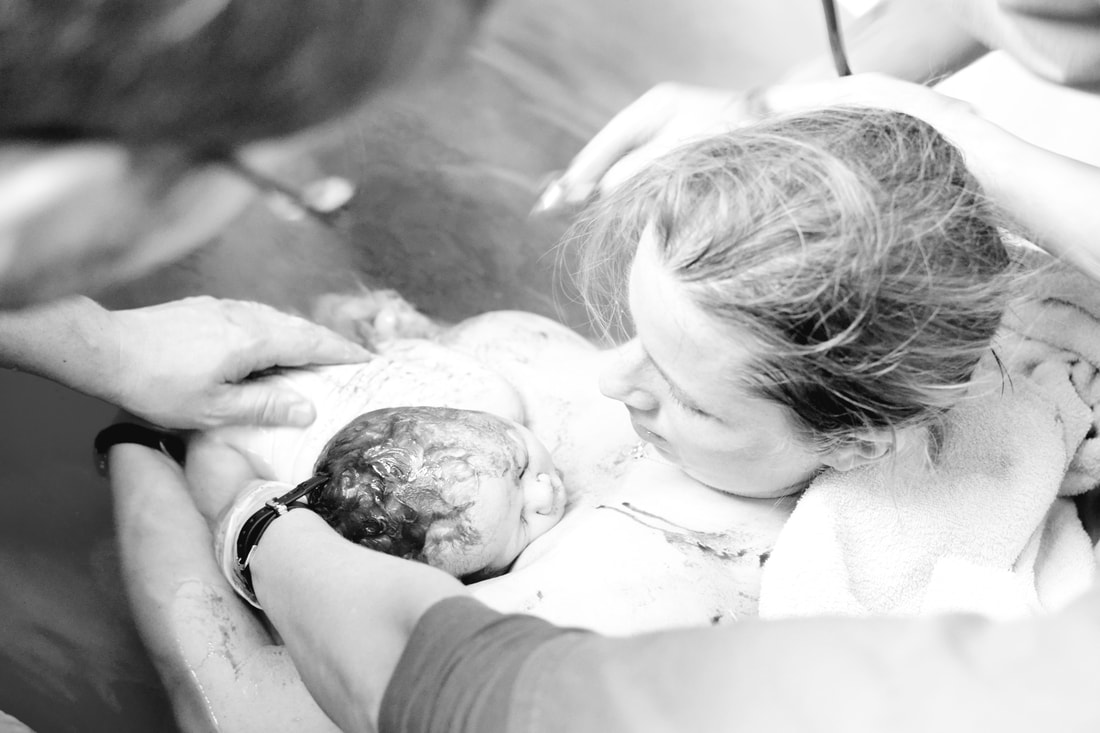Progressive Relaxation 1 is a progressive relaxation session focusing on tensing and releasing the muscles under your conscious control so that you can learn how your muscles feel when they are tense and relaxed. This will help you release the tension in your muscles to conserve energy for the work of birthing your baby and activate the relaxation response. 8 minutes, 46 seconds. Note: there is no background music during this video so that you can use any music you find relaxing, if you choose. If you use the same music during your relaxation sessions, you will condition yourself to respond to the music with relaxation. If you then choose to play the same music during your birth, you are more likely to be relaxed!
0 Comments
I had the opportunity to answer questions and answers about Bonding with Baby yesterday at the free online SuperMoms-in-Training Summit. It was a great experience! Since the actual recording is reserved for summit participants, here's a recap of what I discussed. To bond with baby (as well as older children!) I suggest new parents look into attachment parenting (AP). I would argue that AP is simply instinctive parenting that has been practiced since the beginning of the human race, but it has been promoted in recent decades by Dr. William Sears and his wife, Martha Sears, RN. In their book, Attachment Parenting,* the Searses promote the "Seven B's" of AP:
In my Summit Q & A, I discussed a little bit about each of these practices. One reason I encourage mothers to work toward a natural, unmedicated birth without routine interventions is because such a birth usually provides the best conditions for normal breastfeeding, and breastfeeding is an important factor in bonding. Another important part of Birth Bonding is skin-to-skin contact between mom and baby -- and also dad and baby! And skin-to-skin is something you can do with your baby anytime, not just at birth. Research suggests that Breastfeeding is an important factor in mother-baby bonding. It's important to add that breastfeeding doesn't guarantee bonding, and other feeding choices certainly don't prevent bonding! However, breastfeeding releases bonding hormones in baby and mother, and is known as an important factor in bonding. There was a question about what can be done to prepare for breastfeeding during pregnancy. Make sure to get a lactation consultant lined up before you have a need! If needed, it is much easier to make a call for help to someone with whom you have already established a relationship than cold calling in what might feel like a very emergent situation. A second suggestion I have is to make sure you take a good breastfeeding preparation class! The third B is Babywearing. Babies who are "worn" (carried in a sling or infant carrier) cry less and are perceived as "easier" / happier babies. This can make bonding easier. In addition to babywearing, I also recommend Infant Massage! Infant massage is a wonderful way to promote your baby's physical and emotional health while growing in your bond. I spoke the longest about the fourth B: Bed Sharing because many have concerns about bedsharing safety. It is important to follow safe bed sharing guidelines! If bedsharing isn't something that you are interested in doing, it can be beneficial to sleep close to baby, for example, with baby in a "sidecar" arrangement or with bassinette in your room. I add Baby Sign language to the fifth B: Belief in the signal value of a Baby's Cries. The parent or caregiver recognizes that babies want to communicate their needs and it is our job to observe our babies and learn what their signals mean. Baby Sign language facilitates this process by giving babies a way to communicate their needs, thoughts, and emotions before they are able to speak! A mom asked how many signs to start with. I responded to say that in my Baby Signs classes (designed for babies 6-24 months), I teach about 6 signs per week and that seems to be enough variety without overwhelm. I also recommend starting with the mealtime signs because this is such an important area where parents and babies need to communicate every day! Similar to the Bedsharing B, I recognize that "Beware of Baby Trainers" is one of the more controversial AP practices. To make this less confrontational, I like to explain this one as avoiding those practices that force you to be less responsive to your baby. For example, there are some methods that are designed to "train" a baby not to cry...ever. This is the kind of practice that should be avoided if you want to practice AP, because it interferes with the previous B: recognizing the signal value of a baby's cries. (This B does not mean using gentle methods of weaning or helping your toddler learn to sleep through the night at an appropriate age. Of course all children should wean from the breast and sleep through the night!) The final B, which in my opinion is the most important, is Balance and Boundaries. Parents who gravitate to AP tend to be (like me haha) Type A perfectionists. It is important to be gentle with yourself and make sure your own needs are met: physical, emotional, social, and spiritual. AP can be intense and it is something that requires a lot of energy and commitment for the long-haul. You absolutely need to meet your own needs to be a long-term AP parent. You matter! And your baby does, too! Blessings to you and your baby.
RESOURCES
Once a month, Gina Peterson, IBCLC, and Lexy Backstrom, BfNA (two Catholic Nursing Mothers' League leaders) work with me to support Catholic breastfeeding mothers in two online breastfeeding support groups. We launched these groups in March of 2021, and just celebrated our first anniversary of providing free online breastfeeding education and support. This month's topic is "Working with Your Baby's Natural Instincts to Breastfeed." In preparing for our meeting, I took some time to refresh and expand my knowledge of the many instinctual reflexes newborns have at birth that help them to locate, attach, and breastfeed successfully -- when new mothers are given the freedom to hold their healthy, full-term babies skin-to-skin in laid-back, tummy to tummy positions. My interest was piqued by a 2015 research study, "Intrapartum Synthetic Oxytocin Reduce (sic) the Expression of Primitive Reflexes Associated with Breastfeeding." In this study, the researchers observed that those babies exposed to synthetic oxytocin (i.e., "Pitocin") during birth exhibited fewer primitive neonatal reflexes that are favorable to getting started with breastfeeding as compared to the group of babies with no exposure to synthetic oxytocin. The reflexes that appear to be most affected by exposure to Pitocin include all of the rhythmic reflexes that were studied (suck, jaw jerk, and swallowing). As a group, all the primitive neonatal reflexes that were studied were observed less in the group of newborns exposed to synthetic oxytocin as compared to the newborns who were not exposed. The researchers suggested that it may be possible that synthetic oxytocin could cross through both the placenta (which protects the baby from some harmful substances) as well as the barrier that protects the fetus from substances that could damage his or her developing brain. There were several limitations to the study. The group without synthetic oxytocin exposure included more experienced mothers, and the group with exposure had much higher epidural anesthesia rates. However the researchers did not observe any differences in the rates of newborns exhibiting primitive neonatal reflexes based on these two variables. My intention in sharing this information is to encourage healthy mothers to make it a goal to have a natural, unmedicated birth whenever possible -- with a supportive birth team (including a birth doula if possible), in a birthplace that has a track record of good support for natural birth experiences. For healthy moms and babies, a natural birth is the usually the best foundation for breastfeeding. Assuming mother and baby are healthy, mothers can help baby to get started breastfeeding by laying back, supporting her body in a semi-reclined ("laid-back") position and place baby skin-to-skin and tummy to tummy, allowing baby to self-attach. Of course, even if Pitocin is necessary during a particular mother's birth, this does not mean she and her baby will be unable to breastfeed! My first birth was augmented with Pitocin and my fifth birth was induced with Pitocin, yet both of these babies successfully breastfed into early childhood. In any birth requiring the use of medications, (as well as all natural births!) make sure to get some of each of the four components that help you to succeed when you breastfeed:
As I know from my own experiences, breastfeeding is NOT always easy. And despite doing everything "right", it can be frustrating, exhausting, and sometimes just plain hard work that seems impossible. Your breastfeeding journey is unique to you and your baby; and as always, what works for both of you is what's best for you. Contact me if you need a listening ear or another perspective! resources
|
Details
Archives
November 2023
Categories
All
Enter Your Email Address to get St. Croix Birth Blog Posts in Your Inbox(We don't collect your email address and you won't get anything else from us.)
|



 RSS Feed
RSS Feed